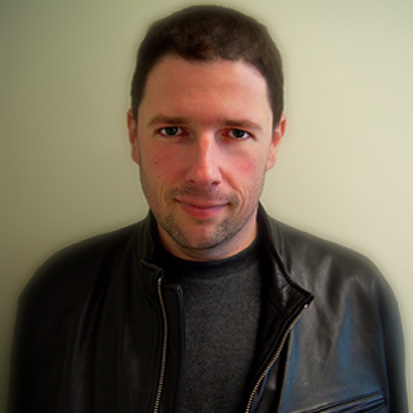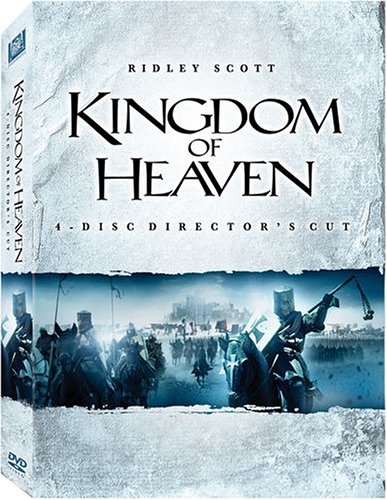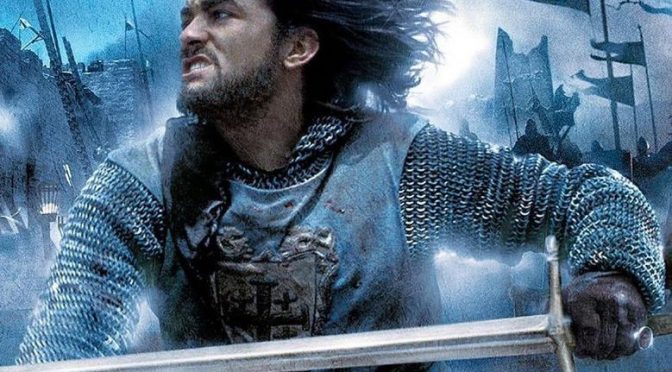Documentariste de Ridley Scott et responsable des éditions DVD de ses films, Charles de Lauzirika s’est occupé des 4 DVD de la Director’s Cut de Kingdom of Heaven après avoir travaillé sur l’édition 2 DVD (il m’en parlait ici). Le film a ses défauts mais les documentaires et interviews sur le tournage de cette super production restent précieux…

Version française éditée de l’interview ci-dessous en scrollant un peu..
Version originale anglaise intégrale…
Bliss : What part of your work you are most proud of on this 4 DVD edition ? And did you fail to achieve something you were aiming at ?
Charles de Lauzirika : I always aim for honesty and meaning in everything my company puts together. We try to avoid promotional fluff at every turn. So I’m most proud of the intimate access we were allowed in documenting the making of this film. You get to see meetings and stages of filmmaking that most other documentarians aren’t allowed to shoot. For instance, on Kingdom of Heaven, Ridley allowed me to shoot his cast rehearsals, something he had never let me, or anyone else, do before. I think Ridley might have had an unfair reputation as a director who doesn’t take care of his actors and I believe this rehearsal footage clearly proves otherwise. Something else I’m very pleased with is the Roadshow presentation of the Director’s Cut. For months, I had been encouraging people in editorial that a film of this scope should be presented with an overture, an intermission and an entr’acte, the same way epics of old were. Everyone was simply too busy finishing the actual Director’s Cut to take that into consideration at the time, so very late in the process, I asked Ridley if we could do that, and he said yes immediately. He got it. I’m relieved that so many fans and reviewers have really appreciated this little nod to past epics.
Bliss : You said once that you always try to avoid the « talking heads » syndrome on screen, so why didn’t you use more voice over real footage than showing the people involved on screen just sitting, surely there are hundred of hours of documentary on location left to show ?
Charles de Lauzirika : Because you end up losing some of the emotions and body language that the interviewee is giving off. You still need a human face to anchor the story to. And in the early stages of pre-production, it’s weird to cut on-set footage because, in context, it hasn’t happened yet. So that leaves you with script pages, which get boring after a while, and reference art, which can be expensive to license. Yes, we have hundreds of hours of behind-the-scenes footage but it needs to mean something when you use it. It’s not just video wallpaper. Every shot, every cut, every soundbite, every piece of music…it all has to add up to something, either informationally, intellectually or emotionally. More than ever, I’m trying to tell a story and not simply run surveillance video like some kind of half-assed webcam. I’ve seen a couple other DVD producers do that and I think it’s a very aloof and lazy way of presenting material.
Bliss : Thanks to your documentary, we witness some unusual things as Ridley Scott commenting the work in progress of the trailer and the actors rehearsing with Ridley Scott when they are, supposedly, at their most vulnerable moments, and it’s presented on the DVD as an unusual and welcome extended length… How did you manage to be accepted by the actors (and the director) and how did you film it (how many cameras, distance from the actors…) ? Did you have to check with them afterward for approval ?
Charles de Lauzirika : In the case of the cast rehearsals, I arrived at the location very early and basically waited in the basement for a few hours while Ridley started working with Orlando and Liam, just to warm them up. At some point, he brought up the idea of shooting this for the DVD, and they agreed, so I was summoned into the rehearsal hall where Orlando and Liam greeted me very warmly, and from that point on, I was fairly well-established in the room, allowing me to shoot whatever I wanted. It was literally just me and my camera. So people start to forget that there’s even a camera in the room, and they really open up. I would shoot from one angle for a while, then quietly move to another spot, and continue this throughout the day, getting closer and closer as a comfort level was reached. Eventually more and more actors would show up, and they were very friendly as well. I think most actors are familiar with the DVD process now, so if the director has no problem with it, chances are, they won’t have a problem with it either.
Bliss : The end of your documentary is not afraid to confront the lacklustre reception of the movie in theatres including bad reviews. Did you have to work hard on that, or were Ridley Scott, and the studio, ready to go along ?
Charles de Lauzirika : In retrospect, I think I went a little too negative with the ending. It’s honest, yes, and you can’t sugarcoat the fact that the film was not a big hit. But at the time we were finishing the documentary, there hadn’t been much reaction to the Director’s Cut yet, so I couldn’t balance things out. It would have been better to portray the film’s theatrical release as a disaster but then give things a more celebratory note at the end, with the overwhelmingly positive reaction to the Director’s Cut. I guess that’s why I titled the documentary »The Path to Redemption, » because it was more about the journey than the arrival.
Bliss : This is presented as the Director’s cut, so that definitely mean there won’t be another cut at some point (from the studio for instance) even though they are 30 mn of cut scenes left ?
Charles de Lauzirika : I seriously doubt there will ever be another cut of this film. I even doubt that we’ll see the theatrical version released again, unless as a supplemental curiosity. There are probably a few more deleted bits that didn’t make this DVD, that could show up on some future release, but there’s really no reason to add them back into the film. This is the definitive cut of the film. End of story.
Bliss : Did you start thinking or working on any new ways of presenting or making bonus material using HD DVD or Blu-Ray high defintion and capacity discs, for this project or any futures one ?
Charles de Lauzirika : I’m always thinking of new ways to present supplemental material, which is why I’ll occasionally experiment on Standard Definition to see if the concept works. Things like the MI6 DataStream on Die Another Day, or Enter The Web on Spider-Man 2, or the Interactive Production Grid on the theatrical version of Kingdom of Heaven, are all baby steps towards what we could eventually be doing on HD or Blu-Ray, if they can ever figure out the technical spec. Right now, you can do more with SD than you can with HD, which is ridiculous for a next generation format. But hopefully they’ll fix that soon.
Propos recueillis en août 2006 par François Bliss de la Boissière

Version française éditée pour publication…
Bliss : En tant que documentariste du film et producteur du DVD, que pensez-vous avoir le mieux réussi sur cette quadruple édition ?
Charles de Lauzirika : L’approche intime que nous avons pu obtenir en suivant ce film. J’ai assisté à des réunions et à des étapes de fabrication que les documentaristes n’ont d’habitude pas le droit de filmer. Je suis également très content de l’ouverture Roadshow de ce Director’s Cut. Pendant des mois j’ai essayé de convaincre qu’un film de cette ampleur devrait être présenté avec une ouverture, un entracte et une intermission comme les anciens péplums. Tout le monde était trop occupé à finaliser le Director’s Cut pour en tenir compte, alors, très tardivement, j’ai demandé à Ridley. Il a compris immédiatement et a dit oui.
Bliss : Pourquoi avoir privilégié les interviews de face que vous aviez dit ne pas aimer faire plutôt que des voix off sur des images inédites ?
Charles de Lauzirika : Parce qu’avec une voix off vous perdez les émotions que l’interviewé révèle avec ses gestes et son corps. Vous avez toujours besoin d’un visage humain pour ancrer l’histoire. Et injecter des images de tournage lorsqu’on parle de pré production serait bizarre puisqu’il n’a pas effectivement commencé. Alors oui, nous avons des centaines d’heures d’images de coulisse mais ce n’est pas juste du papier peint vidéo, elles doivent avoir un sens pour être montrer. Chaque plan, chaque coupe, chaque son, chaque morceau musical s’additionne pour créer quelque chose d’informatif, intellectuellement ou émotionnellement. Plus que jamais j’essaie de raconter une histoire plutôt de faire simplement tourner une caméra vidéo de surveillance sans point de vue comme j’ai vu faire ailleurs.
Bliss : Vous montrez des choses assez rares comme les acteurs en répétition au moment où ils sont le plus vulnérables. Comment avez-vous obtenu ça ?
Charles de Lauzirika : Ridley n’avait effectivement jamais laissé personne filmer les répétitions auparavant. En plein travail avec ses acteurs, il a évoqué cette idée de filmer ce moment pour le DVD et ils ont dit oui. J’ai alors été invité dans la salle de répétition où Orlando et Liam m’ont accueilli très chaleureusement. À partir de ce moment là j’ai pu filmer ce que je voulais. Les gens finissent par oublier qu’il y a une caméra dans la pièce et ils se livrent. Je filmais d’un angle pendant un moment, puis me déplaçais silencieusement jusqu’à un autre spot et ainsi toute la journée, jusqu’à atteindre une distance confortable pour tout le monde. Je pense que la plupart des acteurs sont familiers avec le processus des DVD maintenant, alors si le réalisateur n’a pas de problème avec ça, il y a des chances qu’eux non plus.
Bliss : L’échec critique et commercial du film est évoqué sans détour…
Charles de Lauzirika : Rétrospectivement je crois avoir été trop négatif avec la fin. C’est honnête, oui, on ne peut pas cacher le fait que le film n’a pas été un gros succès. Mais au moment où nous finissions ce documentaire, il n’y avait pas encore eu de réactions au Director’s Cut et je n’ai pas pu mieux équilibrer le propos. Cela aurait été mieux de présenter la sortie en salle comme un désastre puis de finir sur une note plus joyeuse à la fin grâce aux réactions extrêmement positives au Director’s Cut.
Bliss : Ce Director’s Cut est-il bien la version définitive ?
Charles de Lauzirika : Je doute sérieusement qu’il y ait un autre montage et même que l’on revoit un jour la version salle autrement qu’en curiosité offerte en bonus. Il y a probablement quelques morceaux coupés qui pourraient atterrir sur une future édition mais il n’y a aucune raison de les réintroduire dans le film. Ceci est le montage définitif du film. Point final.
Propos recueillis et traduits en août 2006 par François Bliss de la Boissière

(Publié en 2006 dans le mensuel Les Années Laser)
